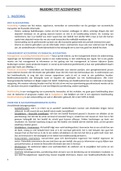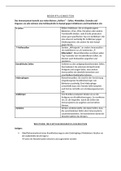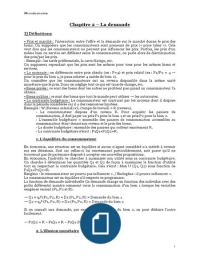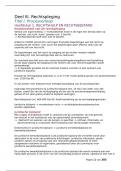Attitudes, Beliefs and Consistency
7-1aAttitudes versus Beliefs
Beliefs are pieces of information (facts or opinions) about an object,
person or issue. Attitudes are global evaluations toward some object or
issue (e.g., you like or dislike something, you are in favour of or opposed
to some position).
If you think that a certain person is president or that it is cloudy outside,
that is a belief. An attitude is whether you like this person as president, or
the clouds. Logically, attitudes are for choosing, whereas beliefs are for
explaining.
7-1bDual Attitudes
Dual attitudes are defined as different evaluations of the same attitude
object: an automatic attitude and a deliberate attitude.
Automatic attitudes are very fast evaluative, ‘gut-level’ responses that
people don’t think a great deal about.
In contrast, deliberate attitudes are more reflective responses that people
think more carefully about.
7-1cWhy People Have Attitudes
Attitudes are cognitive and emotional judgments people form about
various aspects of life, essential for dealing with complex choices and
situations in human life. These evaluations categorize things as "good" or
"bad." Bad judgments are generally stronger and more quickly formed.
Attitudes are vital for quick and effective decision-making, making
choices more manageable and easing the process. Having clear attitudes
in various aspects of life can enhance physical and mental health,
showing the practical value of attitudes in everyday life.
7-2aFormation of Attitudes
Mere Exposure Effect
The mere exposure effect is the tendency for novel (unique or original)
stimuli to be liked more after the individual has been repeatedly exposed
to them.
Social psychologist Robert Zajonc proposed that “mere repeated exposure
of the individual to a stimulus is a sufficient condition for the
enhancement of his attitude toward it”. In plainer terms, simply or just
(merely) seeing something over and over again and nothing else (i.e., no
, contact, no closer inspection like touching or smelling) is enough to make
you like it.
The mere exposure effect, which influences attitudes, can even apply to
attitudes toward oneself. People tend to like the mirror (reversed) image
of their photographs because it's what they're exposed to in the mirror. In
contrast, friends or others who see them directly prefer the true image.
However, there are exceptions: if you initially dislike something, repeated
exposure will likely make you like it even less. This phenomenon is
related to Facebook usage; as people use it more, they tend to like it and
their friends more.
Embodied Attitudes
Charles Darwin suggested that attitudes are evident in body language and
movement. In an experiment, participants who were instructed to nod
their heads in agreement with a message ended up agreeing with it, while
those who shook their heads in disagreement disagreed with the message.
Symbolic body movements can also influence attitudes.
For example, carrying positive or negative thoughts with them in their
pocket led people to hold attitudes consistent with those thoughts,
whereas throwing the thoughts away freed them from their influence.
This shows how physical actions can shape our attitudes.
Classical Conditioning
A type of learning in which, through repeated pairings, a neutral stimulus
comes to evoke a conditioned response.
This concept, based on the work of Ivan Pavlov with dogs, has been
proposed to explain how humans develop attitudes. Day-to-day examples
of this include the association of a specific smell or music with certain
people, situations, or events, both positively and negatively. Classical
conditioning may also help explain the development of prejudice against
social groups when they are frequently associated with negative
information in the media.
Operant Conditioning
Attitudes can also be formed through operant conditioning (also
called instrumental conditioning). In this type of conditioning,
developed by behaviourists such as Edward Thorndike and B. F. Skinner,
people were found to be more likely to repeat behaviours that have been
rewarded. We are less likely to repeat behaviours that have been
punished.
7-1aAttitudes versus Beliefs
Beliefs are pieces of information (facts or opinions) about an object,
person or issue. Attitudes are global evaluations toward some object or
issue (e.g., you like or dislike something, you are in favour of or opposed
to some position).
If you think that a certain person is president or that it is cloudy outside,
that is a belief. An attitude is whether you like this person as president, or
the clouds. Logically, attitudes are for choosing, whereas beliefs are for
explaining.
7-1bDual Attitudes
Dual attitudes are defined as different evaluations of the same attitude
object: an automatic attitude and a deliberate attitude.
Automatic attitudes are very fast evaluative, ‘gut-level’ responses that
people don’t think a great deal about.
In contrast, deliberate attitudes are more reflective responses that people
think more carefully about.
7-1cWhy People Have Attitudes
Attitudes are cognitive and emotional judgments people form about
various aspects of life, essential for dealing with complex choices and
situations in human life. These evaluations categorize things as "good" or
"bad." Bad judgments are generally stronger and more quickly formed.
Attitudes are vital for quick and effective decision-making, making
choices more manageable and easing the process. Having clear attitudes
in various aspects of life can enhance physical and mental health,
showing the practical value of attitudes in everyday life.
7-2aFormation of Attitudes
Mere Exposure Effect
The mere exposure effect is the tendency for novel (unique or original)
stimuli to be liked more after the individual has been repeatedly exposed
to them.
Social psychologist Robert Zajonc proposed that “mere repeated exposure
of the individual to a stimulus is a sufficient condition for the
enhancement of his attitude toward it”. In plainer terms, simply or just
(merely) seeing something over and over again and nothing else (i.e., no
, contact, no closer inspection like touching or smelling) is enough to make
you like it.
The mere exposure effect, which influences attitudes, can even apply to
attitudes toward oneself. People tend to like the mirror (reversed) image
of their photographs because it's what they're exposed to in the mirror. In
contrast, friends or others who see them directly prefer the true image.
However, there are exceptions: if you initially dislike something, repeated
exposure will likely make you like it even less. This phenomenon is
related to Facebook usage; as people use it more, they tend to like it and
their friends more.
Embodied Attitudes
Charles Darwin suggested that attitudes are evident in body language and
movement. In an experiment, participants who were instructed to nod
their heads in agreement with a message ended up agreeing with it, while
those who shook their heads in disagreement disagreed with the message.
Symbolic body movements can also influence attitudes.
For example, carrying positive or negative thoughts with them in their
pocket led people to hold attitudes consistent with those thoughts,
whereas throwing the thoughts away freed them from their influence.
This shows how physical actions can shape our attitudes.
Classical Conditioning
A type of learning in which, through repeated pairings, a neutral stimulus
comes to evoke a conditioned response.
This concept, based on the work of Ivan Pavlov with dogs, has been
proposed to explain how humans develop attitudes. Day-to-day examples
of this include the association of a specific smell or music with certain
people, situations, or events, both positively and negatively. Classical
conditioning may also help explain the development of prejudice against
social groups when they are frequently associated with negative
information in the media.
Operant Conditioning
Attitudes can also be formed through operant conditioning (also
called instrumental conditioning). In this type of conditioning,
developed by behaviourists such as Edward Thorndike and B. F. Skinner,
people were found to be more likely to repeat behaviours that have been
rewarded. We are less likely to repeat behaviours that have been
punished.










